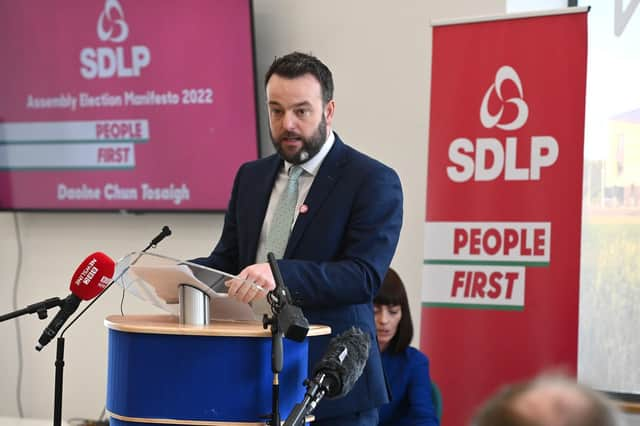Owen Polley: Unionists have an issue with sectarian Sinn Fein, not with nationalism


There were many significant themes to this poll, but three of the most interesting were the continued rise of Alliance, the TUV eating into the DUP’s vote but failing to win more seats and Sinn Fein’s relative success, which was helped along by the collapse of the SDLP.
Early in the counting process, Colum Eastwood tried to explain his party’s poor performance to the BBC.
Advertisement
Hide AdAdvertisement
Hide AdHe claimed that voters opted for Sinn Fein instead of the SDLP because the DUP tried to ‘lock out’ nationalists from the first minister’s role. In fact, he said he ‘completely understood’ this reaction.
It wasn’t much of an excuse, but it revealed the ambivalent attitude that nationalists continue to show toward violent republicanism.
And it went some way toward explaining how a party that has never come close to repudiating its past links to a terrorist movement can top the poll in Northern Ireland.
As the results demonstrated, the DUP’s message at this election didn’t work. Unionists were not prepared to set aside their reservations about the party’s performance, as well as their anger about the protocol, just to prevent Sinn Fein from coming top and calling for a border referendum.
Advertisement
Hide AdAdvertisement
Hide AdIt’s just wrong, though, to imply that the DUP, or anybody else in unionism, tried to ‘lock’ nationalists out of the top job.
Firstly, the primary problem with getting the executive up and running again is the Northern Ireland Protocol.
Northern Ireland has been wrenched away from the rest of the UK, the ‘principle of consent’ that underpinned the Belfast Agreement has been undermined and the power-sharing safeguards that usually apply at Stormont have been set aside, to maintain the sea border against unionists’ wishes.
Secondly, unionists clearly have an issue with Sinn Fein, rather than nationalism per se.
Advertisement
Hide AdAdvertisement
Hide AdThis is a party that continues to celebrate the IRA’s barbarism.
It still takes direction from an ‘army council’, according to security experts on both sides of the border. And, as the counter-extremism expert, Ian Acheson, wrote in an article for the website CapX, it refuses to bring closure to many of the IRA’s victims, despite knowing “where the bodies lie, literally and figuratively”.
Eastwood lectured unionists about their attitude to Michelle O’Neill, but in the Republic, where it is also the biggest party, there is perhaps even more distaste for Sinn Fein. The coalition government in Dublin exists, in large part, to keep the Shinners out of power.
Unionists are used to being demonised and portrayed as extremists. When the DUP agreed to prop up the Theresa May’s Tory government through a ‘confidence and supply’ deal, the media reacted as if the Conservatives were courting Nazis.
Advertisement
Hide AdAdvertisement
Hide AdNow, the TUV’s rise in votes has caused hand-wringing, as nationalists and pro-EU liberals accused Boris Johnson, among others, of ‘radicalising’ unionism against the protocol.
It’s worth remembering, though, that by far the biggest manifestation of continuing sectarian hatred in Northern Ireland is the relative success of Sinn Fein. It did not have to wait even a generation after the IRA stopped murdering and maiming its neighbours to become the largest nationalist party.
If Colum Eastwood, and other constitutional nationalist leaders before him, had spent more time making a clear moral distinction between themselves and Sinn Fein rather than chastising unionists, perhaps they would have retained more support.
Despite Eastwood’s keenness to blame the DUP for the SDLP’s failures, nationalists did not actually move to SF in massive numbers this time. That moral collapse pre-dated this election. Now, nationalism, as well as unionism, is losing voters to the Alliance Party.
Advertisement
Hide AdAdvertisement
Hide AdThis trend suggests that, for all the talk of a border poll before the election, many people who were formerly opposed to Northern Ireland in principle are now reconciled to it existing in the long term. The problem for unionist parties is that, despite the UUP’s attempt to regain liberal votes, their supporters are also still moving to Alliance.
This election result suggests that people in Northern Ireland will increasingly choose between three possible constitutional futures.
We could remain an integral part of the UK and play a full role in its politics, economy and culture, though that position is undermined by the protocol. We could be absorbed by the Republic, with the extremists of Sinn Fein shaping a 32-county state, but that looks ever less likely.
Alliance representatives may not admit it openly, but they stand for a third option. A type of hybrid, where our links to the EU are prioritised over our place in the UK and where our place in a nation state scarcely matters, other than to determine who pays the bills.
Advertisement
Hide AdAdvertisement
Hide AdThat depressing, place apart vision of Northern Ireland still only commands the support of 14% of voters, but it is shared by influential sections of the establishment and it got a boost at this election.
More commentary:
• Emma Little Pengelly: There has been no increase in the nationalist vote in 25 years
• Henry McDonald: A few facts are in order amid breathless reportage about the ‘seismic shift’ towards Sinn Fein
Advertisement
Hide AdAdvertisement
Hide Ad• Editorial May 9: It is clear that unionists need to have option of voting for a liberal party
• Brian John Spencer: Unionism was given no wriggle room by nationalism
• Henry McDonald: Sinn Fein’s day in the sun but no new dawn for Irish unity
• Editorial May 7: Unionism more than ever needs London’s help on the protocol